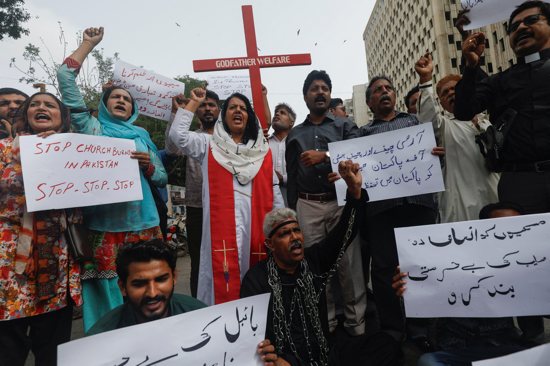
As 2024 begins, Christians in Pakistan are ending a year of violence and chaos, with hopes that a new government will bring respite from their suffering after February’s national elections.
Following one of the country’s worst outbreaks of persecution in a generation, fear and mental trauma persist among Christians in the town of Jaranwala, where thousands of armed Muslims burned at least 19 churches and looted and destroyed hundreds of Christian homes. Jaranwala is located in Faisalabad district, approximately 205 miles south of Islamabad, the capital of Pakistan.
The violence, which began last August after two Christians were accused of tearing up pages of the Koran, has displaced hundreds of Christians. Many have not yet rebuilt their homes and have not returned.
“People are still afraid, and no one knows what will happen next or when it will happen again. Nothing is safe… their lives, their properties and their churches,” Kiran Afzaal, a Catholic lawyer from Lahore, told UCA News.
A 24-year-old Catholic woman from Jaranwala, who did not want her name published for security reasons, said Christians in the area were “still in shock” after the August 16 incident.
The Jaranwala riot was just the latest in a long list of violent incidents targeting Christians.
They face intimidation and threats from Islamic fundamentalists, as well as neglect and apathy from the administration, said Sarfraz Clement, a Catholic political leader in the Diocese of Multan, in the southern Punjab.
“It is visible that hostility against Christians has increased,” he told UCA News.
Christian groups have documented some 25 major incidents, including physical attacks against Christians, kidnappings, rapes and the forced conversion of Christian girls, sometimes minors, to Islam.
Religious groups have identified 109 cases of forced conversions over the past 11 months. Figures show that 25 of them were aged 14 or younger, while around 60 of them were between 14 and 18 years old.
Incidents of Muslims kidnapping Hindu and Christian girls, forcing them to convert, have become commonplace.
But the government denies such incidents and joins the Islamic fundamentalist narrative that girls run away with Muslim men and convert to Islam of their own free will, said Kashif Aslam, a Catholic activist in Lahore.
False allegations of blasphemy and physical attacks are also common, the list says.
Christian leaders say that in the Muslim-dominated country of 220 million people, political leaders compete to appease radical groups and tend to ignore religious minorities such as Christians and Hindus, who number fewer than 4 % Population.
The 2.6 million Christians, who live scattered across the country, have never constituted a politically significant community, except in certain pockets of the Punjab province, which is home to 80% of the country’s Christians.
The administration ignores their complaints and they live as second-class citizens, said Suneel Malik, a Catholic human rights defender from Faisalabad.
Malik shared an incident in Lahore to prove his point. A few days before Christmas, a Christian was playing a Christmas song in his car and a Muslim rudely asked them to turn it off, saying it hurt Muslims’ feelings.
“I don’t understand how a Christmas song can hurt other people’s feelings. However, this is the ground reality and it shows that there is no freedom of speech and freedom of expression for minorities,” Malik said.
Fundamentalist groups are gaining more and more ground in society and within the administration, which threatens the fundamental rights of minorities, Christian leaders say.
“It is a real threat,” said Father Sarfraz Simon of the Islamabad-Rawalpindi diocese.
The year saw the country toughen its blasphemy laws, ignoring calls from Christians to repeal them, which were misused to target them.
Earlier this year, parliament amended and passed the Criminal Laws (Amendment) Bill, increasing the punishment for insulting the companions, wives and family members of the Prophet to 10 years, as well as a fine of $4,424.
“The stress levels of the Christian community have increased in 2023 because their freedoms have diminished and the tools of oppression have become sharper,” Naeem Yousaf Gill, director of the National Justice and Peace Commission, an advocacy organization rights of Pakistani bishops.
“Accusing some people of blasphemy has become the simplest and surest method of attacking a community. The Jaranwala incident is just one example of this fact,” Yousaf said.
“The Catholic Church is trying to improve things. To solve our problems, we need the support of the majority community, and we are also working in this direction,” he said.
Malik said allegations of blasphemy against Christians and Ahmadis – followers of a modern Islamic sect considered heretical by some traditional Muslim scholars – have increased this year. “After every major incident, we hope the government will come up with reforms to stop this madness, but nothing happens,” Malik said.
Christian leaders agree that the general elections scheduled for February would be an opportunity for Christians to engage with political parties and present their demands to their local candidates.
“We need to strengthen our political side from the local government system. This will not only ensure our participation in the political process but also provide political leadership,” Aslam said.
He wanted Christians to become “proactive rather than reactive.”
“Major churches should form a joint think tank to come up with a concrete plan to resolve the problems of Christians in Pakistan,” he added.
The Christian community should together present a series of suggestions to the new government asking it to develop a long-term plan to resolve the problems of minorities.
Aslam said that in 2014, the Supreme Court had asked the government to take substantial measures to ensure the safety of religious minorities, including Christians.
“Such steps should be encouraged to build a better Christian community” in Pakistan, the Catholic activist said.
Aftab Alexander Mughal writes for UCA News, an independent Catholic news service covering East, South and Southeast Asia.


